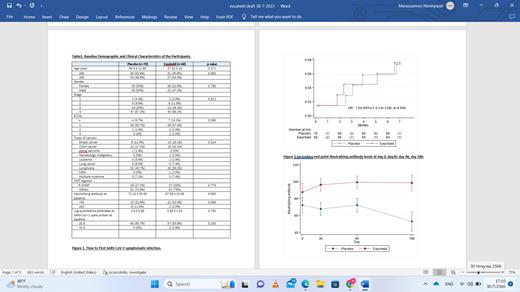Title: Efficacy of Monoclonal antibody Tixagevimab/Cilgavimab for prevention of SARS-CoV-2 infection among cancer patients : Double blined Randomized placebo Controlled trail (ProvMAB trial)
Introduction
Immunocompromised patients, particularly those with a Hematological malignancies or Oncologic malignancies, are at higher risk of SARS-Cov-2 infection, severe outcomes and mortality. Tixagevimab/Cilgavimab is a monoclonal antibody combination which binds to the SARS-CoV-2 spike protein. The PROVENT phase III clinical trial reported that Tixagevimab/Cilgavimab prophylaxis significantly reduced the risk of COVID-19 infection in immunocompromised participants who had not been vaccinated prior to enrollment. However, it should be noted that this trial was conducted before the emergence of the Omicron variant. While the approved Tixagevimab/Cilgavimab combination has demonstrated the ability to decrease the rate of symptomatic SARS-CoV-2 infection in patients at higher risk of inadequate response to vaccination. However, Tixagevimab/Cilgavimab was tested in a few studies that included patients with hematologic malignancies and oncologic malignancies, even if this population has shown an increased risk of unfavorable outcomes following infection (with high rates of hospitalization, intensive care unit admission, and mortality) and poor significant immunization following vaccines.
Method
We performed a randomized clinical trial double blind study to evaluate the rate of SARS-CoV-2 infection following pre-exposure prophylaxis with Tixagevimab/Cilgavimab 150/150 mg versus placebo in Hematologic malignancies and Oncologic malignancies patients who were on active treatment with systemic chemotherapy within 6 months. These patients received at least three doses of vaccination before enrollment, and neutralizing antibody and anti-spike antibody levels were measured at day 0, day 30, day 90 and day 180 after enrollment. The study was started from September 7, 2022, until July 19,2023, with a follow-up period of 180 days for all cases.
Result
A total of 138 participants were recruited, with 68 patients in the intervention arm and 70 patients in the placebo arm. The mean age in the intervention arm was 58 years old, while it was 59 years old in the placebo arm. The cumulative incidence of Covid-19 infection was 7.4% in intervention arm compared to 7.15% in the placebo arm (HR= 1.04; 95% CI :0.3 to 3.58, p-value=0.956). Covid-19-related-hopitalizations were 5.9% of the intervention arm and 1.4% of the placebo arm. No patients need to admit ICU in both arms. No deaths due to Covid-19 infection were reported during the study.
Discussion
In this study, we present our findings comparing Tixagevimab/Cilgavimab in immunocompromised patients who received over three doses of vaccination for the prevention of SARS-CoV-2 infection in patients with hematologic malignancies and Oncologic malignancies undergoing chemotherapy during the SARS-CoV-2 omicron surge. Our results suggest that booster vaccinations, beyond the standard three doses, were sufficient to protect against SARS-CoV-2 infection in this particular patient population, considering their ongoing standard of care during the pandemic variant in the future.
Keywords: SARS-CoV-2, COVID-19, Tixagevimab/Cilgavimab, Hematological malignances, monoclonal antibodies
Disclosures
No relevant conflicts of interest to declare.


